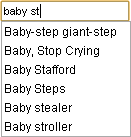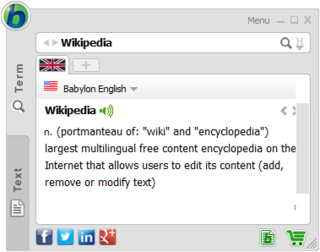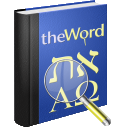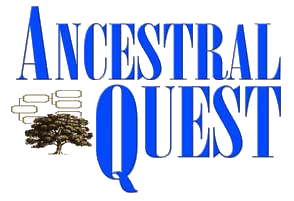
A dictionary is a listing of lexemes from the lexicon of one or more specific languages, often arranged alphabetically, which may include information on definitions, usage, etymologies, pronunciations, translation, etc. It is a lexicographical reference that shows inter-relationships among the data.
An integrated development environment (IDE) is a software application that provides comprehensive facilities for software development. An IDE normally consists of at least a source-code editor, build automation tools, and a debugger. Some IDEs, such as IntelliJ IDEA, Eclipse and Lazarus contain the necessary compiler, interpreter or both; others, such as SharpDevelop and NetBeans, do not.
Lexicography is the study of lexicons, and is divided into two separate academic disciplines. It is the art of compiling dictionaries.
Visual Basic for Applications (VBA) is an implementation of Microsoft's event-driven programming language Visual Basic 6.0 built into most desktop Microsoft Office applications. Although based on pre-.NET Visual Basic, which is no longer supported or updated by Microsoft, the VBA implementation in Office continues to be updated to support new Office features. VBA is used for professional and end-user development due to its perceived ease-of-use, Office's vast installed userbase, and extensive legacy in business.

Autocomplete, or word completion, is a feature in which an application predicts the rest of a word a user is typing. In Android and iOS smartphones, this is called predictive text. In graphical user interfaces, users can typically press the tab key to accept a suggestion or the down arrow key to accept one of several.

WebGUI is an open-source content management system written in Perl and released under the GNU General Public License.

AutoHotkey is a free and open-source custom scripting language for Microsoft Windows, primarily designed to provide easy keyboard shortcuts or hotkeys, fast macro-creation and software automation to allow users of most computer skill levels to automate repetitive tasks in any Windows application. It can easily extend or modify user interfaces. The installation package includes an extensive help file; web-based documentation is also available.

An electronic dictionary is a dictionary whose data exists in digital form and can be accessed through a number of different media. Electronic dictionaries can be found in several forms, including software installed on tablet or desktop computers, mobile apps, web applications, and as a built-in function of E-readers. They may be free or require payment.

A bilingual dictionary or translation dictionary is a specialized dictionary used to translate words or phrases from one language to another. Bilingual dictionaries can be unidirectional, meaning that they list the meanings of words of one language in another, or can be bidirectional, allowing translation to and from both languages. Bidirectional bilingual dictionaries usually consist of two sections, each listing words and phrases of one language alphabetically along with their translation. In addition to the translation, a bilingual dictionary usually indicates the part of speech, gender, verb type, declension model and other grammatical clues to help a non-native speaker use the word. Other features sometimes present in bilingual dictionaries are lists of phrases, usage and style guides, verb tables, maps and grammar references. In contrast to the bilingual dictionary, a monolingual dictionary defines words and phrases instead of translating them.

TED Notepad is freeware portable text editor software for Microsoft Windows, developed by Juraj Šimlovič since 2001, originally as a school project. It looks similar to Windows Notepad, but provides additional features, including experimental line completion and selection jumping.
A foreign language writing aid is a computer program or any other instrument that assists a non-native language user in writing decently in their target language. Assistive operations can be classified into two categories: on-the-fly prompts and post-writing checks. Assisted aspects of writing include: lexical, syntactic, lexical semantic and idiomatic expression transfer, etc. Different types of foreign language writing aids include automated proofreading applications, text corpora, dictionaries, translation aids and orthography aids.
Beryl T. "Sue" Atkins was a British lexicographer, specialising in computational lexicography, who pioneered the creation of bilingual dictionaries from corpus data.

Babylon is a computer dictionary and translation program developed by the Israeli company Babylon Software Ltd. based in the city of Or Yehuda. The company was established in 1997 by the Israeli entrepreneur Amnon Ovadia. Its IPO took place ten years later. It is considered a part of Israel's Download Valley, a cluster of software companies monetizing "free" software downloads through adware. Babylon includes in-house proprietary dictionaries, as well as community-created dictionaries and glossaries. It is a tool used for translation and conversion of currencies, measurements and time, and for obtaining other contextual information. The program also uses a text-to-speech agent, so users hear the proper pronunciation of words and text. Babylon has developed 36 English-based proprietary dictionaries in 21 languages. In 2008–2009, Babylon reported earnings of 50 million NIS through its collaboration with Google.

FREELANG is a bilingual and free dictionary for Microsoft Windows. Founded in 1997 by Beaumont, FREELANG is free to download (freeware) but is under copyright of the authors, and it is collaborative.
Biblical software or Bible software is a group of computer applications designed to read, study and in some cases discuss biblical texts and concepts. Biblical software programs are similar to e-book readers in that they include digitally formatted books, may be used to display a wide variety of inspirational books and Bibles, and can be used on portable computers. However, biblical software is geared more toward word and phrase searches, accessing study bible notes and commentaries, referencing various modern translations, cross-referencing similar passages and topics, biblical dictionaries, original language texts and language tools, maps, charts, and other e-books deemed relevant to understanding texts from a philological approach.

theWord is a free Bible study software application for Microsoft Windows. It was first released in 2003 and developed by Costas Stergiou. It offers Bibles, commentaries, dictionaries, general books, maps, search capabilities, and support for Bibles in several languages.

Ancestral Quest (AQ) is a genealogy software application for Microsoft Windows developed by Incline Software, LC. It features data entry with sourcing capabilities and scrapbook extensions; a print engine for standard or custom charts and reports; a web page creator; a collaboration engine; and an extension tool for other genealogy databases.
Nota Bene is an integrated software suite of applications, including word processing, reference management, and document text analysis software that is focused on writers and scholars in the Humanities, Social Sciences, and the Arts. The integrated suite is referred to as the Nota Bene Workstation. It runs on Microsoft Windows and Macintosh.
The following outline is provided as an overview of and topical guide to the Perl programming language:

Sketch Engine is a corpus manager and text analysis software developed by Lexical Computing CZ s.r.o. since 2003. Its purpose is to enable people studying language behaviour to search large text collections according to complex and linguistically motivated queries. Sketch Engine gained its name after one of the key features, word sketches: one-page, automatic, corpus-derived summaries of a word's grammatical and collocational behaviour. Currently, it supports and provides corpora in 90+ languages.










